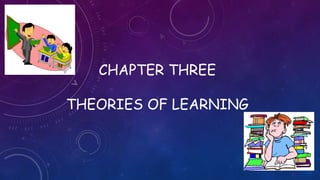
theories of learning
- 1. CHAPTER THREE THEORIES OF LEARNING
- 2. We have know how animals learn than how children learn, and we have know how children learn than about how adult learn, perhaps this is because the study of learning was taken over early by experimental psychologists. The fact is then that many of the “scientific” theories of learning have been delivered from the study of learning by animals and children. We have a list of propounders and interpreters ordered in who made the greatest impact on the thinking of other:
- 4. TYPES OF THEORIES The proliferation of propounders has presented a major challenge to the interpreters because they try to sort of order in learning theories, for example: Hilgard and Bower’s in 1996 identify 11 categories that are: Thorndike’s Connectionism Pavlov’s Classical Conditioning Guthrie’s Contiguous Conditioning Skinner’s Operant Conditioning Hull’s Systematic Behavior Theory Tolman’s Purposive Behaviorism Gestalt Theory Freud’s Psychodynamics Functionalism Mathematical Learning Theory Information Processing Models
- 5. McDonald (1964) breaks the theories down into six categories in his analysis: Recapitulation (Hull) Connectionism (Thorndike) Pragmatism (Dewey) Gestalt and Field Theory (Ogden, Hartman, Lewin) Dynamic Psychology (Freud) Functionalism (Judd) Gage (1972) identifies three families of learning theories: (1) Conditioning, (2) Modeling, and (3) Cognitive.
- 6. Kingsley and Garry (1957) provide two sets: (1) Association or stimulus-response (Thorndike, Guthrie, and Hull) and (2) Field Theories (Lewin,Tolman, and the gestalt psychologists). Taba (1962) agrees with the two-family set, but uses different labels: (1) Associationist or Behaviorist theories and (2) Organismic, Gestalt, and Field Theories.
- 7. Learning theories fall into two major families: behaviorist/connectionist theories. cognitive/gestalt theories. In 1970, two developmental psychologists, Hayne W. Reese and Willis F. Overton, presented a way to conceptualize the theories in terms of larger models: The mechanistic or elemental model. The organismic or holistic model. The Concept of Part and Whole Models of Development
- 8. THEORIES BASED ON AN ELEMENTAL MODEL Thorndike’s system has sometimes been called psychology or connectionism and he developed three laws that he believed governed the learning of animals and human beings: The law of readiness The law of exercise The law of effect Hilgard and Bower describe his classical experimental, when meat powder is placed in a dog’s mouth, salivation takes place; the food is the unconditioned stimulus and salivation is the unconditioned reflex.
- 9. THEORIES BASED ON A HOLISTIC MODEL John Dewey in 1896 launched the first protest against the elemental model of the Associationist, and became the starting point for a line of theorizing that has been given the label functionalism. And translate into schoolroom, Whoever Hilgard and Bower summarized the functionalism in: The functionalist is tolerant but critical. The functionalist prefers continuities over discontinuities or typologies. The functionalist is an experimentalist. The functionalist is biased toward Associationist and environmentalism. In a sense Edward Tolman represent a bridge between the elemental and the holistic model.
- 10. According to the theories of the Germans Wertheimer, Koffka, and Kohler said that all learning consisted of the simple connection of responses to stimuli. And the learner tends to organize his or her perceptual field according to four laws: The law of proximity. The law of similarity and familiarity. The law of closure. The law of continuation. Two other contemporary psychologists, Jean Piaget and Jerome Bruner, have had great impact on thinking about learning, although they are not literally learning theorists.
- 11. Piaget has conceptualized the process of the development of cognition and thought in evolutionary stages: The formation of the symbolic or semiotic function (ages 2 to 7 or 8) The formation of concrete mental operations (ages 7 or 8 to 11 or 12) The formation of conceptual thought or formal operations(ages 11 or 12 through adolescence).
